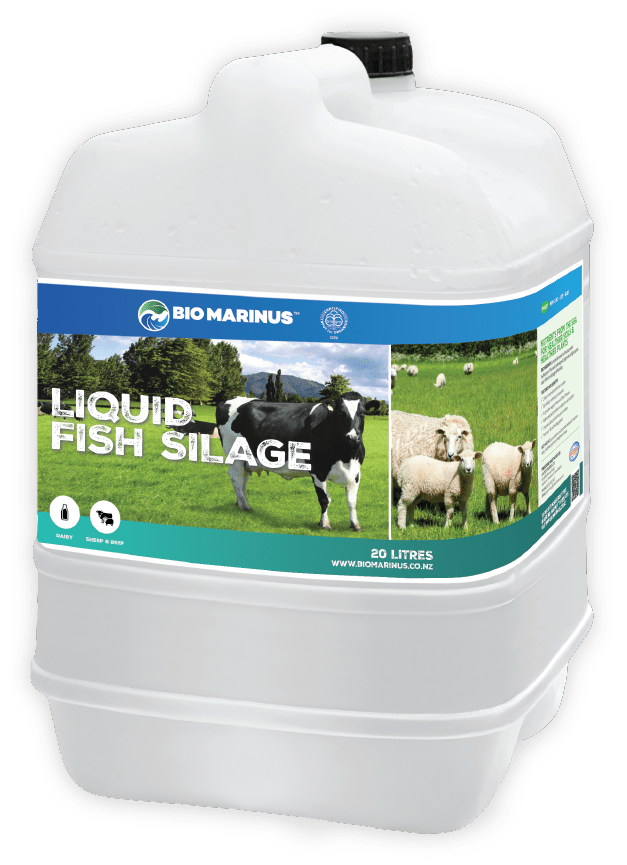The fisheries industry wants to reduce waste and generate more value from by-products. The agricultural industry wants to maintain high productivity and minimise nitrogen losses. Local company United Fisheries has developed a liquid fertiliser from fish offal that could help both industries achieve these goals by turning the low-value fish waste stream into a value-added product that improves pasture and reduces nitrate leaching.
Using seafood as silage is not new. There is an evidence base to support the general benefits of using of fish waste as fertiliser, but studies are needed to evaluate the impacts of a particular product in a specific application.
The Bio Marinus product developed by United Fisheries is a fish liquid fertiliser which is currently on the Aotearoa New Zealand market. Fish offal is channelled through a screw conveyor to a digester tank where it is heated to 65°C and hydrolysed by plant enzymes to turn it into a liquid state. After enzymatically hydrolysing overnight, a filtering step ensures that the liquid will flow smoothly through hoses and sprayers. A common organic acid is added to stabilise the protein and oil rich liquid fertiliser before it is cooled to 20°C and decanted into containers.
Early small-scale studies undertaken through a project with Lincoln University and jointly funded by Seafood Innovations Ltd demonstrated benefits of the fertiliser. The findings included no ill effects on cows when used as feed or fertiliser,[1] the ability to use less nitrogen in standard fertilisers when combined with Bio Marinus,[2, 3] improved pasture quality[2, 3] and enriched Omega-3 content in lamb meat.[4]

These findings suggest multiple value-add opportunities for Bio Marinus. For example, in the US Omega-3-enriched beef is sold as premium, healthy meat and there may be a similar opportunity here. Better quality milk could add value to our milk products, and reduction in nitrate run-off has potential positive implications for climate change and water quality, both of which could draw a higher value.
In addition to the preliminary research results, the company reports that farmer feedback has alluded to further benefits of using the fertiliser but these are yet to be backed up by scientific evidence.
In order to realise the added value of Bio Marinus’ benefits, the encouraging early results and feedback need to be backed up with evidence from larger scale studies. United Fisheries has proposed such studies in collaboration with Manaaki Whenua.
In order to realise the added value of these benefits, the encouraging early results and feedback need to be backed up with larger scale studies.
This example highlights that there may be untapped value in our fisheries by-products because of barriers to undertaking research. Companies need reputable studies and robust evidence to make the claims associated with higher-value products. Making sure we have a responsive research system that companies can access to support product development within their operating budgets is crucial to maximising the value from our commercial fisheries.
There may be untapped value in our fisheries by-products because of barriers to undertaking research.
References and footnotes
[1] Gibbs, J. (2015) Project summary report: The effect of united fisheries fish hydrolysate on milk taint, cow health and production.
[2] Carey, P. and Jiang, S. (2011) The effect of Bio Marinus liquid fish fertiliser on pasture growth in Canterbury: Preliminary trials, Land Research Services Client Report.
[3] Carey, P. and Jiang, S. (2012) The effect of Bio Marinus liquid fish fertiliser on pasture growth in Canterbury: Year 2 trials – summary, Land Research Services Client Report.
[4] Gibbs, J. (2015) Project summary report: Enriching meat and milk with omega 3 oils using fish hydrolysate.
